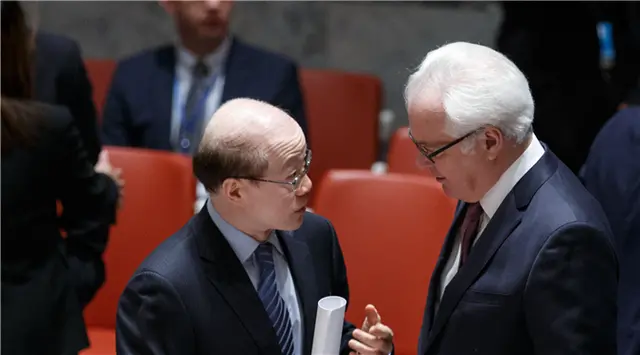The UN Security Council adopted a resolution on Wednesday that imposes new sanctions on the Democratic People's Republic of Korea (DPRK) in order to curb the country's nuclear and missile programs.
The resolution was unanimously adopted by the 15 members of the council in response to DPRK's nuclear test on Jan. 6 and a satellite launch on Feb. 7.
In a statement, the council condemned in the strongest terms the nuclear test on Jan. 6 and the satellite launch on Feb. 7, which it said used ballistic missile technology banned by previous UN resolutions. Pyongyang insisted it was a peaceful satellite launch.
The council also reiterated its demands that the DPRK abandon all nuclear weapons and other nuclear programs as well as weapons of mass destruction and ballistic missile programs.
Wednesday's resolution includes a ban on all exports from the DPRK of coal, iron, iron ore, gold, titanium ore, vanadium ore and rare earth metals. It also places a prohibition on supply of all types of aviation fuel, including rocket fuel, to the DPRK.
Moreover, it requires states to inspect all cargo going to and from the DPRK. Previous sanction measures only required states to inspect cargo when there was reason to believe that it contained prohibited items.
The resolution also imposes an asset freeze on all funds and other economic resources owned or controlled, directly or indirectly, by the DPRK government or by the Workers' Party of Korea, if found to be associated with its nuclear or ballistic missile programs or any other prohibited activities.
Reiterating "the importance of maintaining peace and stability on the Korean Peninsula and in northeast Asia at large," the resolution expresses the council's commitment to a peaceful, diplomatic and political solution to the situation.
The resolution also calls for the resumption of the six-party talks, a multilateral dialogue mechanism brokered by China in efforts to seek a peaceful solution to the nuclear issue on the Korean Peninsula. It also involves the United States, Russia and Japan, as well as the two sides on the Korean Peninsula.
UN Secretary-General Ban Ki-moon on Wednesday welcomed the Security Council's move, saying the DPRK "must return to full compliance with its international obligations."
Stressing that sanctions are not the objective, Liu Jieyi, China's permanent representative to the UN, said the resolution itself cannot offer a fundamental solution to the Korean Peninsula nuclear issue, and dialogue is the only viable way to resolve the issue.
The adoption of the resolution on Wednesday should be a new starting point and a paving stone for political settlement of the nuclear issue on the Korean Peninsula, he said.
China, a major player in promoting peace and stability on the Korean Peninsula, has repeatedly said it opposes any unilateral move that escalates tension on the peninsula, insisting the nuclear issue on the Korean Peninsula be resolved via dialogue.
Vitaly Churkin, Russian permanent representative to the UN, also stressed that the newly-passed sanctions, though quite tough, are not an end in themselves, but rather just a way to ensure that all parties involved return to the negotiating table.
"The United Nations Security Council resolution on DPRK leaves Pyongyang with an option to return to the six-party talks, which should be resumed as soon as possible," he said.
U.S. President Barack Obama also welcomed the UN resolution, calling it "a firm, united, and appropriate response by the international community" to halt DPRK's nuclear and missile programs.
The sanctions in Wednesday's resolution represent the fifth round of sanctions imposed against the DPRK since 2006.
The DPRK conducted three nuclear tests in 2006, 2009 and 2013, respectively. Right after Pyongyang's first nuclear test, the Security Council adopted a resolution to impose sanctions on the DPRK and set up a sanctions committee.
In response to the nuclear tests conducted by the DPRK in 2009 and 2013, the council adopted another three resolutions to strengthen various sanctions on the DPRK, which include an arms embargo, an embargo related to nuclear, ballistic missile, and a ban on the export of luxury goods. (Guan Jianwu in Washington, Ding Chao in Moscow, Gu Zhenqiu at the UN contributed to the story)
 简体中文
简体中文





